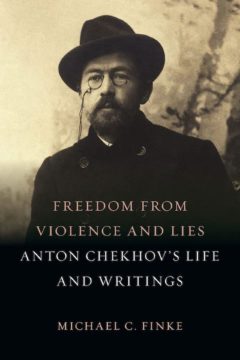Bob Blaisdell in the Los Angeles Review of Books:
 Chekhov is easier to know and read than the other Russian giants. He doesn’t look big or talk big. He’s funny on purpose. He shows us how to read him; he quietly attunes us to place and situation. We observe more than judge his characters’ actions; we detect their mental and emotional states through their physical symptoms. Chekhov began his professional career as a writer while in medical school. Even as he imagined the agitations and disruptions and occasional explosions of his characters, he was always also a doctor. He describes what it feels like to fall in love, to be pregnant and to miscarry, to bully one’s children, to flutter about helplessly while seeking someone to love, to have typhus, to cringe with embarrassment over a bespattering sneeze, to blather like a professor, to be struck dumb by love, to beg for sympathy, to grieve, to menace the innocent, to be conscious of but prey to one’s weaknesses, to be overworked to the point of hallucinating, to be ruthless.
Chekhov is easier to know and read than the other Russian giants. He doesn’t look big or talk big. He’s funny on purpose. He shows us how to read him; he quietly attunes us to place and situation. We observe more than judge his characters’ actions; we detect their mental and emotional states through their physical symptoms. Chekhov began his professional career as a writer while in medical school. Even as he imagined the agitations and disruptions and occasional explosions of his characters, he was always also a doctor. He describes what it feels like to fall in love, to be pregnant and to miscarry, to bully one’s children, to flutter about helplessly while seeking someone to love, to have typhus, to cringe with embarrassment over a bespattering sneeze, to blather like a professor, to be struck dumb by love, to beg for sympathy, to grieve, to menace the innocent, to be conscious of but prey to one’s weaknesses, to be overworked to the point of hallucinating, to be ruthless.
More here.
